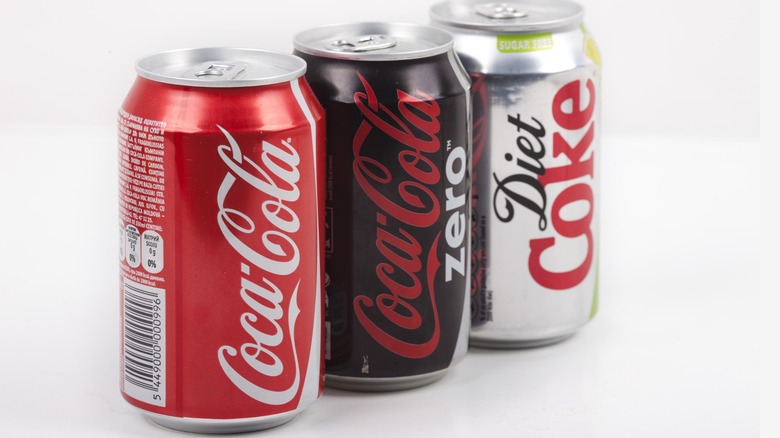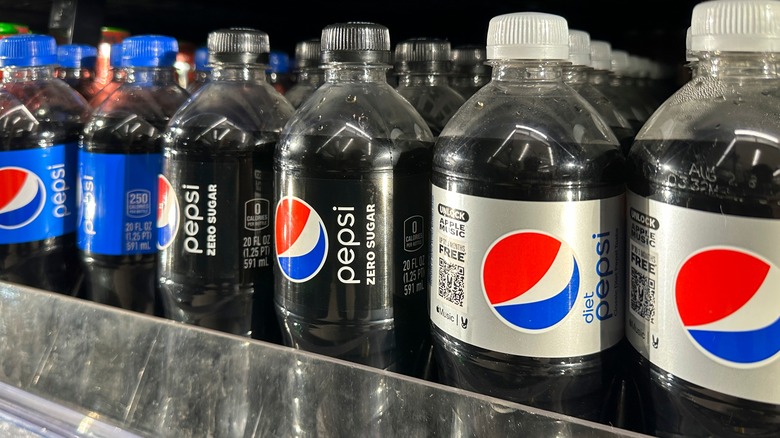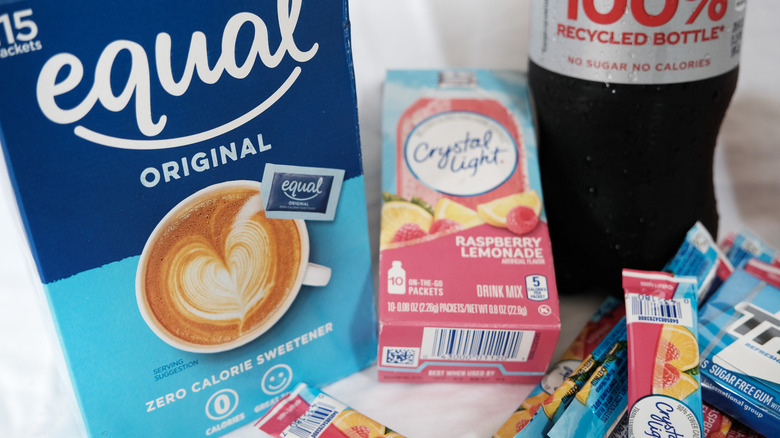Zero Sugar Vs Diet: The Difference Between Zero-Calorie Soda Labels
Craving a fizzy drink but your diet doesn't allow for much sugar? As luck would have it, just about every popular soda brand now offers no-calorie alternatives to their more popular full-sugar sodas. As you browse through the shelf, you'll often find a selection of zero-sugar sodas and diet sodas.
While there are many products on the market, let's focus on Coca-Cola (which has Coke Zero and Diet Coke) and Pepsi (Pepsi Zero Sugar and Diet Pepsi) for now. Both the Zero and Diet versions are sugar-free and calorie-free ... so why bother making two separate products?
The answer lies in the artificial sweeteners used. While Diet Coke contains only aspartame, zero-sugar sodas such as Coke Zero Sugar, Pepsi Zero Sugar and Diet Pepsi uses both aspartame and Ace-K, also known as acesulfame potassium. These different sweetener combinations, along with other minor ingredient variations, result in different flavor profiles between the two. Diet sodas have a lighter taste compared to the classic, full-sugar soda. In general, zero-sugar sodas tastes more like the original recipe that they were made from.
A brief history of zero-calorie sodas
Diet sodas first hit the market in the 1950s, coinciding with a shift towards healthier eating habits. As more people grew conscious of their sugar intake, soda companies saw an opportunity. By introducing no sugar, zero-calorie sodas, it promises the same classic taste of colas but with less than a calorie per serving.
Diet sodas initially used artificial sweeteners such as cyclamates and saccharin as a sweetener. However, health concerns over these two sweeteners in the 1970s eventually led companies to pivot to aspartame. It's 200 times sweeter than regular sugar while having no caloric content, making it the perfect sugar substitute for diet sodas.
Zero-sugar sodas came much later, with Coca‑Cola Zero debuting in 2005 and the North American version of Pepsi Max (the initial version of Zero Sugar) in 2007. But they weren't the same as the original cola drinks. To mimic their full-sugar counterparts, these newer zero-sugar drinks used two artificial sweeteners, Ace-K and aspartame. The main difference between the two versions comes down to its flavors. If you like the regular cola better but don't want the calories, you'll enjoy the zero-sugar version much more.
Are the sweeteners harmful?
The link between artificial sweeteners and potential cancer risk is a decade-long debacle that only intensified in 2023 when the World Health Organization classified aspartame as "possibly carcinogenic to humans." Despite the alarming statement, it's no reason to chuck away all your zero-calorie sodas just yet. The WHO's statement isn't a definitive verdict on aspartame's harm. Instead, it's more of a call for additional research into its potential health effects. Currently, the FDA still considers aspartame safe for consumption with a daily upper limit of 50 milligrams per kilogram of body weight per day. To put that into perspective, according to according to the American Cancer Society, it's the equivalent of about a dozen cans of diet soda back to back.
Ace-K has also faced some scrutiny of its own. However, as of March 2024, the FDA maintains that it can still be safely consumed. For now, you can still enjoy a can without worrying too much about the health effects. As with many things in life, moderation is key!


